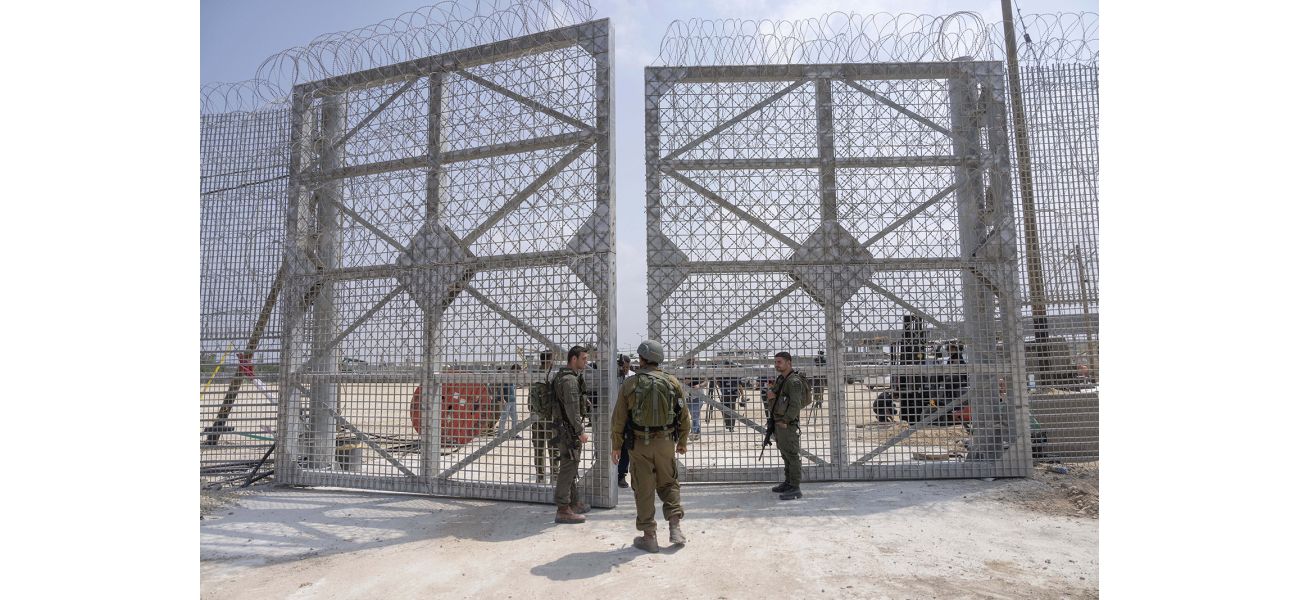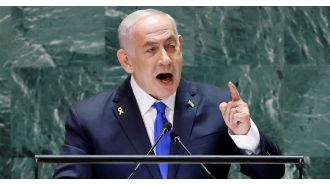Netanyahu considering removing civilians from northern Gaza and halting aid.
Remaining individuals would be classified as combatants, giving military the authority to use lethal force and withholding basic necessities.
October 14th 2024.

Israeli Prime Minister Benjamin Netanyahu is currently considering a plan to cut off humanitarian aid to the northern region of Gaza, with the goal of forcing Hamas militants to surrender. This plan, if put into action, could potentially leave hundreds of thousands of Palestinians without access to food or water, as they are unable or unwilling to leave their homes.
Throughout the year-long war, Israel has issued multiple evacuation orders for the northern region, with the most recent one being issued just last Sunday. However, a group of retired generals has proposed a new plan to Netanyahu and the Israeli parliament, which would give Palestinians one week to vacate the northern third of Gaza, including Gaza City, before declaring it a closed military zone.
Under this plan, those who choose to stay behind would be considered combatants and could potentially be killed by Israeli troops. They would also be denied access to vital resources such as food, water, medicine, and fuel. The chief architect of this plan, who provided a copy to The Associated Press, believes that this is the only way to weaken Hamas in the north and put pressure on them to release their remaining hostages.
The proposed plan also calls for Israel to maintain control over the northern region for an indefinite period, with the aim of creating a new administration without Hamas. This would effectively split the Gaza Strip into two parts. However, it is important to note that the government has not yet made a final decision on whether or not to implement this plan, and it is unclear how seriously it is being considered.
When asked if the recent evacuation orders in northern Gaza were the first steps towards the implementation of the "Generals' Plan," Israeli military spokesperson Lieutenant Colonel Nadav Shoshani stated that they had not received such a plan. However, there are reports that parts of the plan may already be in effect, although it is not clear which ones. Another Israeli official confirmed that Netanyahu has read and studied the plan, as he has with many others throughout the course of the war, but did not indicate whether any parts of it have been adopted. These officials spoke on the condition of anonymity, as the plan is not meant to be discussed publicly.
On Sunday, Israel launched an offensive against Hamas fighters in the Jabaliya refugee camp, located in the northern region of Gaza. According to the United Nations, the amount of aid reaching this area has significantly decreased since October 1. The US State Department has also expressed its opposition to any plan that would result in direct Israeli occupation of Gaza.
Human rights groups are deeply concerned about the potential impact of this plan on civilians. They believe that it would ultimately lead to the starvation of innocent people and is in violation of international law, which prohibits the use of food as a weapon and forced transfers of people. These accusations are central to the genocide case that has been brought against Israel at the International Court of Justice, although Israel denies them.
A coalition of Israeli NGOs has urged the international community to take action, stating that there are alarming signs that the Israeli military is beginning to quietly implement the plan. They also emphasized that states have a responsibility to prevent crimes such as starvation and forced transfers. They warned that continuing to take a "wait and see" approach would only allow Israel to carry out its plan to "liquidate" the northern region of Gaza.
So far, very few Palestinians have heeded the latest evacuation order. Some are elderly, sick, or afraid to leave their homes, while others fear that they will never be allowed to return. Israel has already prevented those who fled earlier in the war from coming back. Jomana Elkhalili, a 26-year-old Palestinian aid worker for Oxfam who currently lives in Gaza City with her family, shared that all Gazans are afraid of this plan. However, they are determined not to make the same mistake again and leave their homes. They believe that there is no safe place for them to go, especially in southern Gaza where the majority of the population lives in overcrowded tent camps, and airstrikes frequently hit shelters. For them, staying put is a better option than leaving and facing an uncertain fate.
This plan has come into consideration as Hamas has continued to show their strength, launching rockets towards Tel Aviv and regrouping in different areas even after being pushed back by Israeli troops. The situation in Gaza remains tense and uncertain, and it is up to the international community to take action to prevent any further harm to innocent civilians.
The Israeli Prime Minister, Benjamin Netanyahu, is considering a new plan that would cut off humanitarian aid to the northern region of Gaza in an attempt to weaken the Hamas militants. This plan, if put into action, could leave hundreds of thousands of Palestinians without access to food or water, as they would be unable or unwilling to leave their homes.
Throughout the year-long war, Israel has issued several evacuation orders for the northern region, with the most recent being issued just last Sunday. However, a group of retired generals has proposed a new plan to Netanyahu and the Israeli parliament, which would further escalate the pressure on Hamas. This plan would give the Palestinians one week to evacuate the northern third of the Gaza Strip, including Gaza City, before declaring it a closed military zone.
Under this plan, those who choose to remain in the area would be considered combatants, meaning that Israeli troops would have the authority to use lethal force against them. They would also be denied access to food, water, medicine, and fuel. The chief architect of the plan, who provided a copy to The Associated Press, believes that this is the only way to weaken Hamas in the northern region and force them to release their remaining hostages.
The plan also calls for Israel to maintain control over the northern region for an indefinite period of time in an attempt to establish a new administration without Hamas, effectively dividing the Gaza Strip in two. However, it is still uncertain whether the government will fully implement this plan, as it is currently being discussed and evaluated.
When asked if the recent evacuation orders in northern Gaza were a part of the "Generals' Plan," an Israeli military spokesperson, Lieutenant Colonel Nadav Shoshani, denied any knowledge of such a plan. However, sources with knowledge of the matter have stated that parts of the plan are already being put into action, though they did not specify which parts. Another official also confirmed that Netanyahu has read and studied the plan, but it is not clear if any parts of it have been adopted. Due to the sensitive nature of the plan, these officials chose to speak anonymously.
Just recently, Israel launched an offensive against Hamas fighters in the Jabaliya refugee camp, which is located north of Gaza City. This has resulted in a significant decline in aid reaching the northern region, according to the United Nations. However, the US State Department has expressed their opposition to any plan that would result in direct Israeli occupation in Gaza.
Human rights groups have also raised concerns about this plan, as they fear it could lead to the starvation of civilians and violate international laws that prohibit using food as a weapon and forcibly transferring populations. These accusations have been central to the genocide case brought against Israel at the International Court of Justice, though Israel has denied these allegations.
A coalition of Israeli NGOs has urged the international community to take action, stating that there are signs that the Israeli military is already implementing this plan. They also stressed that other countries have an obligation to prevent crimes such as starvation and forced transfers, and warned that not acting quickly could result in the complete destruction of the northern region of Gaza.
Despite the evacuation orders, very few Palestinians have actually left the area. Many fear that there is nowhere safe for them to go and that they will not be allowed to return once they leave. Israel has already prevented those who fled earlier in the war from returning to their homes.
Jomana Elkhalili, a 26-year-old Palestinian aid worker for Oxfam, expressed the fear and uncertainty felt by many in Gaza City. She stated that, while people are afraid of the plan, they are also hesitant to leave their homes. Despite the danger, many choose to stay, as they believe that the southern region of Gaza, where most of the population is currently taking refuge, is not a safe place to be.
As this plan continues to be discussed and evaluated, Hamas has shown resilience and strength, firing rockets into Tel Aviv and regrouping in areas after Israeli troops withdraw. This has resulted in multiple offensives by the Israeli military, with no clear end to the conflict in sight.
Throughout the year-long war, Israel has issued multiple evacuation orders for the northern region, with the most recent one being issued just last Sunday. However, a group of retired generals has proposed a new plan to Netanyahu and the Israeli parliament, which would give Palestinians one week to vacate the northern third of Gaza, including Gaza City, before declaring it a closed military zone.
Under this plan, those who choose to stay behind would be considered combatants and could potentially be killed by Israeli troops. They would also be denied access to vital resources such as food, water, medicine, and fuel. The chief architect of this plan, who provided a copy to The Associated Press, believes that this is the only way to weaken Hamas in the north and put pressure on them to release their remaining hostages.
The proposed plan also calls for Israel to maintain control over the northern region for an indefinite period, with the aim of creating a new administration without Hamas. This would effectively split the Gaza Strip into two parts. However, it is important to note that the government has not yet made a final decision on whether or not to implement this plan, and it is unclear how seriously it is being considered.
When asked if the recent evacuation orders in northern Gaza were the first steps towards the implementation of the "Generals' Plan," Israeli military spokesperson Lieutenant Colonel Nadav Shoshani stated that they had not received such a plan. However, there are reports that parts of the plan may already be in effect, although it is not clear which ones. Another Israeli official confirmed that Netanyahu has read and studied the plan, as he has with many others throughout the course of the war, but did not indicate whether any parts of it have been adopted. These officials spoke on the condition of anonymity, as the plan is not meant to be discussed publicly.
On Sunday, Israel launched an offensive against Hamas fighters in the Jabaliya refugee camp, located in the northern region of Gaza. According to the United Nations, the amount of aid reaching this area has significantly decreased since October 1. The US State Department has also expressed its opposition to any plan that would result in direct Israeli occupation of Gaza.
Human rights groups are deeply concerned about the potential impact of this plan on civilians. They believe that it would ultimately lead to the starvation of innocent people and is in violation of international law, which prohibits the use of food as a weapon and forced transfers of people. These accusations are central to the genocide case that has been brought against Israel at the International Court of Justice, although Israel denies them.
A coalition of Israeli NGOs has urged the international community to take action, stating that there are alarming signs that the Israeli military is beginning to quietly implement the plan. They also emphasized that states have a responsibility to prevent crimes such as starvation and forced transfers. They warned that continuing to take a "wait and see" approach would only allow Israel to carry out its plan to "liquidate" the northern region of Gaza.
So far, very few Palestinians have heeded the latest evacuation order. Some are elderly, sick, or afraid to leave their homes, while others fear that they will never be allowed to return. Israel has already prevented those who fled earlier in the war from coming back. Jomana Elkhalili, a 26-year-old Palestinian aid worker for Oxfam who currently lives in Gaza City with her family, shared that all Gazans are afraid of this plan. However, they are determined not to make the same mistake again and leave their homes. They believe that there is no safe place for them to go, especially in southern Gaza where the majority of the population lives in overcrowded tent camps, and airstrikes frequently hit shelters. For them, staying put is a better option than leaving and facing an uncertain fate.
This plan has come into consideration as Hamas has continued to show their strength, launching rockets towards Tel Aviv and regrouping in different areas even after being pushed back by Israeli troops. The situation in Gaza remains tense and uncertain, and it is up to the international community to take action to prevent any further harm to innocent civilians.
The Israeli Prime Minister, Benjamin Netanyahu, is considering a new plan that would cut off humanitarian aid to the northern region of Gaza in an attempt to weaken the Hamas militants. This plan, if put into action, could leave hundreds of thousands of Palestinians without access to food or water, as they would be unable or unwilling to leave their homes.
Throughout the year-long war, Israel has issued several evacuation orders for the northern region, with the most recent being issued just last Sunday. However, a group of retired generals has proposed a new plan to Netanyahu and the Israeli parliament, which would further escalate the pressure on Hamas. This plan would give the Palestinians one week to evacuate the northern third of the Gaza Strip, including Gaza City, before declaring it a closed military zone.
Under this plan, those who choose to remain in the area would be considered combatants, meaning that Israeli troops would have the authority to use lethal force against them. They would also be denied access to food, water, medicine, and fuel. The chief architect of the plan, who provided a copy to The Associated Press, believes that this is the only way to weaken Hamas in the northern region and force them to release their remaining hostages.
The plan also calls for Israel to maintain control over the northern region for an indefinite period of time in an attempt to establish a new administration without Hamas, effectively dividing the Gaza Strip in two. However, it is still uncertain whether the government will fully implement this plan, as it is currently being discussed and evaluated.
When asked if the recent evacuation orders in northern Gaza were a part of the "Generals' Plan," an Israeli military spokesperson, Lieutenant Colonel Nadav Shoshani, denied any knowledge of such a plan. However, sources with knowledge of the matter have stated that parts of the plan are already being put into action, though they did not specify which parts. Another official also confirmed that Netanyahu has read and studied the plan, but it is not clear if any parts of it have been adopted. Due to the sensitive nature of the plan, these officials chose to speak anonymously.
Just recently, Israel launched an offensive against Hamas fighters in the Jabaliya refugee camp, which is located north of Gaza City. This has resulted in a significant decline in aid reaching the northern region, according to the United Nations. However, the US State Department has expressed their opposition to any plan that would result in direct Israeli occupation in Gaza.
Human rights groups have also raised concerns about this plan, as they fear it could lead to the starvation of civilians and violate international laws that prohibit using food as a weapon and forcibly transferring populations. These accusations have been central to the genocide case brought against Israel at the International Court of Justice, though Israel has denied these allegations.
A coalition of Israeli NGOs has urged the international community to take action, stating that there are signs that the Israeli military is already implementing this plan. They also stressed that other countries have an obligation to prevent crimes such as starvation and forced transfers, and warned that not acting quickly could result in the complete destruction of the northern region of Gaza.
Despite the evacuation orders, very few Palestinians have actually left the area. Many fear that there is nowhere safe for them to go and that they will not be allowed to return once they leave. Israel has already prevented those who fled earlier in the war from returning to their homes.
Jomana Elkhalili, a 26-year-old Palestinian aid worker for Oxfam, expressed the fear and uncertainty felt by many in Gaza City. She stated that, while people are afraid of the plan, they are also hesitant to leave their homes. Despite the danger, many choose to stay, as they believe that the southern region of Gaza, where most of the population is currently taking refuge, is not a safe place to be.
As this plan continues to be discussed and evaluated, Hamas has shown resilience and strength, firing rockets into Tel Aviv and regrouping in areas after Israeli troops withdraw. This has resulted in multiple offensives by the Israeli military, with no clear end to the conflict in sight.
[This article has been trending online recently and has been generated with AI. Your feed is customized.]
[Generative AI is experimental.]
0
0
Submit Comment





